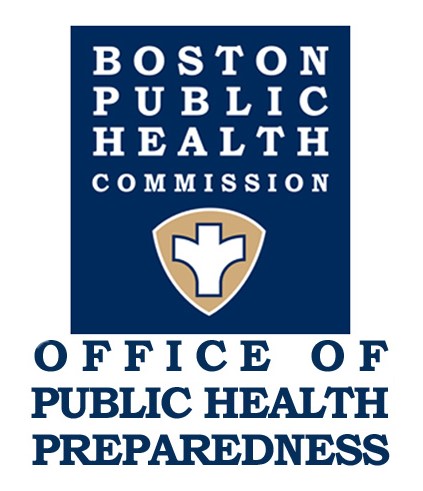Office of Public Health Preparedness
The Office of Public Health Preparedness (OPHP) is an office within the Boston Public Health Commission. Working to ensure equitable access to health and human services during and after emergencies, their work focuses on improving health outcomes of the whole community, especially those impacted by racism and systemic inequities.
MISSION STATEMENT
The Office of Public Health Preparedness’ mission is grounded in the overarching mission and goals of the Boston Public Health Commission, which includes a focus on health equity and serving all Boston residents, particularly the most vulnerable. The mission of the Office of Public Health Preparedness is to enhance community, public health, and healthcare system resilience in order to prepare for, respond to, and recover from emergencies that impact health and access to healthcare.
VISION STATEMENT
The Office of Public Health Preparedness envisions a resilient Boston through healthy, informed, and connected communities that are supported every day and during emergencies by strong, integrated public health and healthcare systems. To that end, we have dedicated goals we continuously strive to achieve.
Goals
- Increase BPHC’s capacity to manage small- and large-scale incidents impacting BPHC operations.
- Respond to emergencies impacting the health of the City.
- Increase City of Boston’s ability to achieve optimum health after disasters
- Strengthen the community resilience of Boston.
- Improve OPHP’s infrastructure to maximize efficiency and promote innovation.
Areas of Work
Areas of WorkThe DelValle Institute for Emergency Preparedness is a program of the Office of Public Health Preparedness at BPHC. The DelValle Institute provides high-quality all-hazards training and exercises. This training develops and enhances capabilities-based disaster informed preparedness. The institute delivers these offerings across the spectrum of first responders, public health and healthcare agencies, and community and private sector partners.
Founded in 2003, DelValle is named in honor of Manuel Del Valle, Jr. a firefighter with Engine 5 for the New York City Fire Department. Manuel died responding to the September 11th terrorist attack. He was the stepson of Dr. Peter Moyer, former Medical Director for Boston's public safety agencies, Police, Fire, and EMS.
The Medical Intelligence Center (MIC) functions as the multi-agency coordinating center for public health and healthcare organizations for the City of Boston and its partners.
In 2008, The Office of Public Health Preparedness (OPHP) opened the Stephen M. Lawlor Medical Intelligence Center (MIC) located at Boston EMS Headquarters. The MIC functions as the multi-agency coordinating center for public health and healthcare organizations for the City of Boston and its partners. The MIC also serves as the Department Operations Center (DOC) for BPHC.
During a major emergency or disaster, it is essential that medical and public health services establish centralized, coordinated management. The MIC provides virtual and face-to-face coordination and management in order to maintain the health and safety of all Boston residents.
The Boston Medical Reserve Corps (Boston MRC) is a community-based volunteer program that prepares for and responds to emergencies.
Boston MRC volunteers prepare for and respond to emergencies to support the City of Boston's public health infrastructure. Members of the Boston MRC organize and train to address a wide range of challenges from disaster response to public health education. Boston MRC members from both the medical and nonmedical fields are leaders in their communities. They donate time and expertise to ensure all Bostonians, especially the most vulnerable, have access to the help they need during a public health emergency.
The Boston Healthcare Preparedness Coalition (HPC) is a partnership consisting of community health centers, emergency medical services (EMS), hospitals, long term care, public health, and other planning partners. These partners coordinate for a unified response to emergencies affecting public health.
Development and revision of plans happens as part of an ongoing planning process. The process includes stakeholders from all levels of government, private sector partners, and non-profit partners.
Planning areas of focus include:
-
Emergency Operations Planning (EOP)
During emergencies that impact healthcare infrastructure the OPHP provides support for the essential services BPHC and the healthcare community provide.
-
Continuity of Operations Planning (COOP)
Continually develops and revises plans to reflect the business continuity needs of the BPHC. It ensures that during an incident, businesses and organizations can continue providing essential services. It also ensures that essential business operations can continue with little disruption.
-
Access and Functional Needs
Ensuring continual planning for the needs of severely impacted residents during an emergency incident. This includes working with public and private agencies that work closely with Boston's vulnerable populations.
-
Risk Communications
Communicating with the public and partner organizations during any emergency incident is essential. OPHP ensures all planning efforts are reflective of how to integrate appropriate agency Public Information Officers, media outlets, and community partners into messaging.
-
Hazard Vulnerability Analysis (HVA)
We identify risks to the community and healthcare infrastructure through ongoing hazard vulnerability analysis. It identifies the most likely hazards and how severe the impact to Boston will be. This helps guide the construction and content of all plans.
Plan Maintenance
We test and exercise plans on a regular basis, in compliance with the DHS Homeland Security Exercise & Evaluation Program. This ensures plans reflect the most up-to-date and accurate information.



